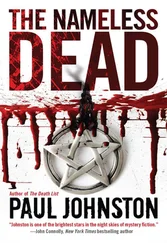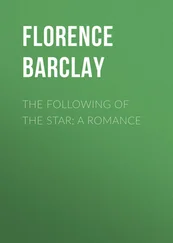Maureen Johnson - The Name of the Star
Здесь есть возможность читать онлайн «Maureen Johnson - The Name of the Star» — ознакомительный отрывок электронной книги совершенно бесплатно, а после прочтения отрывка купить полную версию. В некоторых случаях можно слушать аудио, скачать через торрент в формате fb2 и присутствует краткое содержание. Жанр: Старинная литература, на английском языке. Описание произведения, (предисловие) а так же отзывы посетителей доступны на портале библиотеки ЛибКат.
- Название:The Name of the Star
- Автор:
- Жанр:
- Год:неизвестен
- ISBN:нет данных
- Рейтинг книги:4 / 5. Голосов: 1
-
Избранное:Добавить в избранное
- Отзывы:
-
Ваша оценка:
- 80
- 1
- 2
- 3
- 4
- 5
The Name of the Star: краткое содержание, описание и аннотация
Предлагаем к чтению аннотацию, описание, краткое содержание или предисловие (зависит от того, что написал сам автор книги «The Name of the Star»). Если вы не нашли необходимую информацию о книге — напишите в комментариях, мы постараемся отыскать её.
The Name of the Star — читать онлайн ознакомительный отрывок
Ниже представлен текст книги, разбитый по страницам. Система сохранения места последней прочитанной страницы, позволяет с удобством читать онлайн бесплатно книгу «The Name of the Star», без необходимости каждый раз заново искать на чём Вы остановились. Поставьте закладку, и сможете в любой момент перейти на страницу, на которой закончили чтение.
Интервал:
Закладка:
Somewhere around 1920, someone realized this was all kind of horrible, and the buildings were sold off. Someone had the bright idea that these Gothic and Georgian buildings arranged around a square kind of looked like a school, and bought them. The workhouses became classroom buildings. The church eventually became the refectory. The buildings were all made of brownstone or brick at a time when space in the East End came cheap, so they were large, with big windows and peaks and chimneys silhouetted against the sky.
“This is your building here,” Mr. Franks said as the car bumped along a narrow cobblestone path. It was Hawthorne, the girls’ dorm. The word WOMEN was carved in bas-relief over the doorway. Standing right under this, as proof, was a woman. She was short, maybe just five feet tall, but broad. Her face was a deep, flushed red, and she had big hands, hands you’d imagine could make really big meatballs or squeeze the air out of tires. She had a bob haircut that was almost completely square, and was wearing a plaid dress made of hearty wool. Something about her suggested that her leisure activities included wrestling large woodland animals and banging bricks together.
As I got out of the van she called, “Au ror a!” in a penetrating voice that could cause a small bird to fall dead out of the sky.
“Call me Claudia,” she boomed. “I’m housemistress of Hawthorne. Welcome to Wexford.”
“Thanks,” I said, my ears still ringing. “But it’s Rory.”
“Rory. Of course. Everything all right, then? Good flight?”
“Great, thank you.” I hurried to the back of the van and tried to get to the bags before Mr. Franks broke his spine in three places hauling them out. Flip-flops and cobblestones do not go well together, however, especially after a rain, when every slight indentation is filled with cold water. My feet were soaked, and I was sliding and stumbling over the stones. Mr. Franks beat me to the back of the car, and grunted as he yanked the bags out.
“Mr. Franks will bring those inside,” Claudia said. “Take them to room twenty-seven, please, Franks.”
“Righto,” he wheezed.
The rain started to patter down lightly as Claudia opened the door, and I entered my new home for the first time.
2
IWAS IN A FOYER PANELED IN DARK WOOD WITH A mosaic floor. A large banner bearing the words WELCOME BACK TO WEXFORD hung from the inner doorway. A set of winding wooden steps led up to what I guessed were our rooms. On the wall, a large bulletin board was already full of flyers for various sports and theater tryouts.
“Call me Claudia,” Claudia said again. “Come through this way so we can have a chat.”
She led me through a door on the left, into an office. The room had been painted a deep, scholarly shade of maroon, and there was a large Oriental rug on the floor. The walls and shelves were mostly covered in hockey awards, pictures of hockey teams, mounted hockey sticks. Some of the awards had years on them and names of schools, telling me that Claudia was now in her early thirties. This amazed me, since she looked older than Granny Deveaux. Though to be fair, Granny Deveaux had permanent makeup tattooed on her eyes and bought her jeans in the juniors department at Kohl’s. Whereas Claudia, it was clear, didn’t mind getting out there in the elements and perpetrating a little physical violence in the name of sport. I could easily picture her running over a muddy hillside, field hockey stick raised, screaming. In fact, I was pretty sure that was what I was going to see in my dreams tonight.
“These are my rooms,” she said, indicating the office and whatever splendors lay behind the door by the window. “I live here, and I am available at all times for emergencies, and until nine every evening if you just want to chat. Now, let’s go through some basics. This year, you are the only student coming from abroad. As you probably know, our system here is different from the one you have at home. Here, students take tests called GCSEs when they are about sixteen . . .”
I did know this. There was no way I could have prepared to come here without knowing this. The GCSEs are individual tests on pretty much every subject you’ve ever studied, ever. People take between eight and fourteen of these things, depending, I guess, on how much they like taking tests. How you do on your GCSEs determines how you’re going to spend your next two years, because when you’re seventeen and eighteen, you get to specialize. Wexford was a strange and rare thing: a boarding “sixth-form college”— college here meaning “school for seventeen- and eighteen-year-olds.” It was for people who couldn’t afford five years in a fancy private school, or hated the school they were in and wanted to live in London. People only attended Wexford for two years, so instead of moving in with a bunch of people who had known each other forever , at Wexford, my new fellow students would have been together for a year at most.
“Here, at Wexford,” she went on, “students take four or five subjects each year. They are studying for their A-level exams, which they take at the end of their final year. You are welcome to sit for the A levels if you like, but since you do not require them, we can set up a separate system of grading to send back to America. I see you’ll be taking five subjects—English literature, history, French, art history, and further maths. Here is your schedule.”
She passed me a piece of paper with a huge grid on it. The schedule itself didn’t have that day-in, day-out sameness I was used to. Instead, I got this bananas spreadsheet that spanned two weeks, full of double periods and free periods.
I stared at this mess and gave up any hope of ever memorizing it.
“Now,” Claudia said, “breakfast is at seven each morning. Classes begin at eight fifteen, with a lunch break at eleven thirty. At two forty-five you change for sport—that’s from three to four. Then you shower and have class again from four fifteen until five fifteen. Dinner is from six to seven. Then the evenings are for clubs, or more sport, or work. Of course, we still need to put you into your sport. May I recommend hockey? I am in charge of the girls’ hockey team. I think you’d enjoy it.”
This was the part I’d been dreading. I am not a very sporty person. Where I come from, it’s too hot to run, and it’s generally not encouraged. The joke is, if you see someone running in Bénouville, you run in the same direction, because there’s probably something really terrible right behind them. At Wexford, daily physical activity was required. My choices were football (a.k.a. soccer, a.k.a. a lot of running outdoors), swimming (no), hockey (by this they meant field, not ice), or netball. I hate all sports, but basketball I at least know something about—and netball was supposed to be the cousin of basketball. You know how girls play softball instead of baseball? Well, netball is the softball version of basketball, if that makes any sense. The ball is softer, and smaller, and white, and some of the rules are different . . . but basically, it’s basketball.
“I was thinking netball,” I said.
“I see. Have you ever played hockey before?”
I looked around at the hockey decorations.
“I’ve never played it. I really only know basketball, so netball—”
“Completely different. We could start you fresh in hockey. How about we just do that now, hmmm?”
Claudia leaned over the desk and smiled and knitted her meaty hands together.
“Sure,” I heard myself say. I wanted to suck the word back into my mouth, but Claudia had already grabbed her pen and was scribbling something down and muttering, “Excellent, excellent. We’ll get you set up with a hockey kit. Oh, and of course you’ll need these.”
Читать дальшеИнтервал:
Закладка:
Похожие книги на «The Name of the Star»
Представляем Вашему вниманию похожие книги на «The Name of the Star» списком для выбора. Мы отобрали схожую по названию и смыслу литературу в надежде предоставить читателям больше вариантов отыскать новые, интересные, ещё непрочитанные произведения.
Обсуждение, отзывы о книге «The Name of the Star» и просто собственные мнения читателей. Оставьте ваши комментарии, напишите, что Вы думаете о произведении, его смысле или главных героях. Укажите что конкретно понравилось, а что нет, и почему Вы так считаете.









